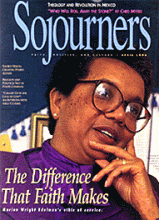Good movies are often not easy to watch for progressive Christian-types. In films of lesser quality, the action and violence is an end in itself rather than a vehicle to drive the drama. In better movies, stories often include violence that depicts the breadth and depth of the drama and evokes the emotions of the viewer.
In the Name of the Father (Universal Studios, 1993) is not an easy movie to watch. But it is a great movie.
This dramatic depiction of a real-world story of government cover-up in Northern Ireland and England opens by showing the level of desperation and despair felt by the working-class young people in Belfast in the early ’70s. That despair for some becomes focused in the violent activities of the Irish Republican Army, such as the bombings of tactical targets in London, including the Guildford Pub explosion that killed four. Londoners were struck with consummate fear.
The public outcry for justice—or more accurately the fear of further violence—creates a public relations nightmare for the British government and police force. The perpetrators need to be brought to justice, and quickly, to contain the fear of the populace.
In such times individual rights are often sacrificed. And so it was for Gerry Conlon (Daniel Day-Lewis), his friends, and his family.
After his arrest, conviction, and sentencing, Conlon increasingly begins to see the world through the eyes of those who had planted the Guildford bombs. As he confronts the violence he experiences in prison, he himself becomes more violent...and self-destructive.
His antagonist in prison is his own father, who was also wrongly arrested for providing logistical support for the bombers. Guiseppe Conlon (Oscar nominee Peter Postlethwaite) never loses faith in the steadfastness of God, the power of a nonviolent campaign, and the possibility for renewal of the political system. This is not fervent ideology for him; it is merely his nature.
Read the Full Article
